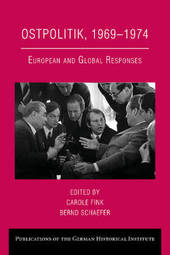
|
Ostpolitik, 1969-1974: European and Global Responses
Paperback / softback
Main Details
| Title |
Ostpolitik, 1969-1974: European and Global Responses
|
| Authors and Contributors |
Edited by Carole Fink
|
|
Edited by Bernd Schaefer
|
| Series | Publications of the German Historical Institute |
|---|
| Physical Properties |
| Format:Paperback / softback | | Pages:322 | | Dimensions(mm): Height 229,Width 152 |
|
| ISBN/Barcode |
9780521181525
|
| Classifications | Dewey:327.4304709047 |
|---|
| Audience | | Professional & Vocational | |
|---|
| Illustrations |
Worked examples or Exercises
|
|
Publishing Details |
| Publisher |
Cambridge University Press
|
| Imprint |
Cambridge University Press
|
| Publication Date |
17 February 2011 |
| Publication Country |
United Kingdom
|
Description
Studies of the Cold War transcend a narrow focus on four decades of superpower rivalry, recognizing that leaders and governments outside of Washington and Moscow also exerted political, economic, and moral influence well beyond their own borders. One striking example was the Ostpolitik of Chancellor Willy Brandt, which not only redefined Germany's relation with its Nazi past but also altered the global environment of the Cold War. This book examines the years 1969-1974, when Brandt broke the Cold War stalemate in Europe by assuming responsibility for the crimes of the Third Reich and by formally renouncing several major West German claims, while also launching an assertive policy toward his Communist neighbors and conducting a deft balancing act between East and West. Not everyone then, or now, applauds the ethos and practice of Ostpolitik, but no one can deny its impact on German, European, and world history.
Reviews'On the issues and countries it covers, the book sheds considerable light ...' International Affairs 'A fascinating collection of essays accompanies this picture, and the strongest impression they leave is that of Brandt's perspicacity ... As a step toward globalizing our understanding of the Ostpolitik, this volume accurately reflects Brandt's times and Brandt's ambition. It is a first-rate contribution to the literature.' The Journal of Central European History
|